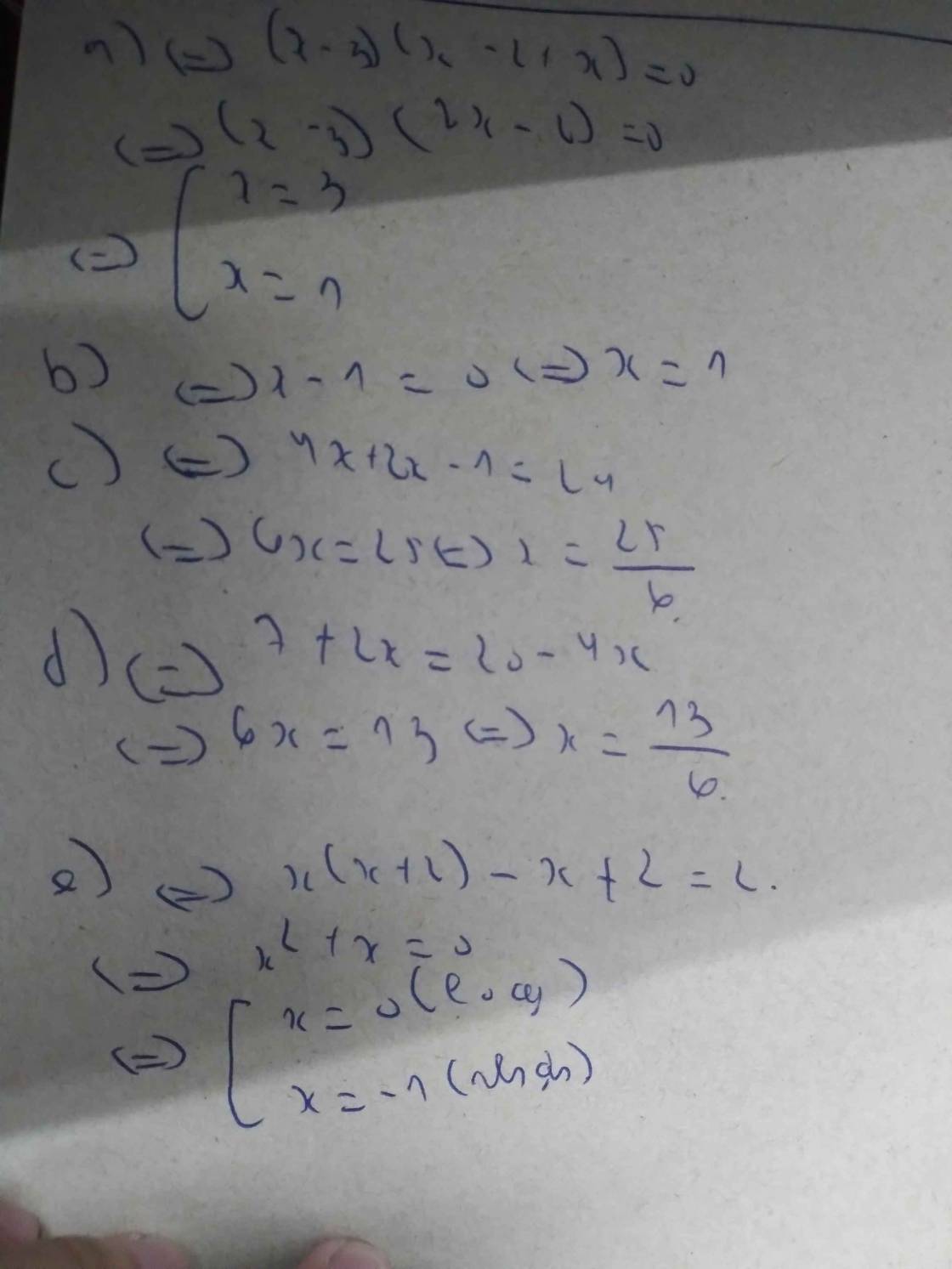
Hãy nhập câu hỏi của bạn vào đây, nếu là tài khoản VIP, bạn sẽ được ưu tiên trả lời.


ta có : x^5+2x^4+3x^3+3x^2+2x+1=0
\(\Leftrightarrow\)x^5+x^4+x^4+x^3+2x^3+2x^2+x^2+x+x+1=0
\(\Leftrightarrow\)(x^5+x^4)+(x^4+x^3)+(2x^3+2x^2)+(x^2+x)+(x+1)=0
\(\Leftrightarrow\)x^4(x+1)+x^3(x+1)+2x^2(x+1)+x(x+1)+(x+1)=0
\(\Leftrightarrow\)(x+1)(x^4+x^3+2x^2+x+1)=0
\(\Leftrightarrow\)(x+1)(x^4+x^3+x^2+x^2+x+1)=0
\(\Leftrightarrow\)(x+1)[x^2(x^2+x+1)+(x^2+x+1)]=0
\(\Leftrightarrow\)(x+1)(x^2+x+1)(x^2+1)=0
VÌ x^2+x+1=(x+\(\dfrac{1}{2}\))^2+\(\dfrac{3}{4}\)\(\ne0\) và x^2+1\(\ne0\)
\(\Rightarrow\)x+1=0
\(\Rightarrow\)x=-1
CÒN CÂU B TỰ LÀM (02042006)
b: x^4+3x^3-2x^2+x-3=0
=>x^4-x^3+4x^3-4x^2+2x^2-2x+3x-3=0
=>(x-1)(x^3+4x^2+2x+3)=0
=>x-1=0
=>x=1

a, \(5\left|2x-1\right|-3=7\Leftrightarrow5\left|2x-1\right|=10\Leftrightarrow\left|2x-1\right|=2\)
TH1 : \(2x-1=2\Leftrightarrow x=\frac{3}{2}\)
TH2 : \(2x-1=-2\Leftrightarrow x=-\frac{1}{2}\)
b, \(\left(2x+3\right)\left(x-2\right)-x^2+4=0\Leftrightarrow\left(2x+3\right)\left(x-2\right)-\left(x-2\right)\left(x+2\right)=0\)
\(\Leftrightarrow\left(x-2\right)\left(2x+3-x-2\right)=0\Leftrightarrow\left(x-2\right)\left(x+1\right)=0\Leftrightarrow x=-1;x=2\)
c, \(\frac{2x-3}{2}< \frac{1-3x}{-5}\Leftrightarrow\frac{2x-3}{2}+\frac{1-3x}{5}< 0\)
\(\Leftrightarrow\frac{10x-15+2-6x}{10}< 0\Rightarrow4x-13< 0\Leftrightarrow x< \frac{13}{4}\)

a) \(x^5+2x^4+3x^3+3x^2+2x+1=0\)
\(\Leftrightarrow x^5+x^4+x^4+x^3+2x^3+2x^2+x^2+x+x+1=0\)
\(\Leftrightarrow x^4\left(x+1\right)+x^3\left(x+1\right)+2x^2\left(x+1\right)+x\left(x+1\right)+\left(x+1\right)=0\)
\(\Leftrightarrow\left(x+1\right)\left(x^4+x^3+2x^2+x+1\right)=0\)
\(\Leftrightarrow\left(x+1\right)\left(x^4+x^3+x^2+x^2+x+1\right)=0\)
\(\Leftrightarrow\left(x+1\right)\left[x^2\left(x^2+x+1\right)+\left(x^2+x+1\right)\right]=0\)
\(\Leftrightarrow\left(x+1\right)\left(x^2+x+1\right)\left(x^2+1\right)=0\)
Dễ thấy \(x^2+x+1>0\forall x;x^2+1>0\forall x\)
\(\Rightarrow x+1=0\)
\(\Leftrightarrow x=-1\)
Vậy....
b) \(x^4+3x^3-2x^2+x-3=0\)
\(\Leftrightarrow x^4-x^3+4x^3-4x^2+2x^2-2x+3x-3=0\)
\(\Leftrightarrow x^3\left(x-1\right)+4x^2\left(x-1\right)+2x\left(x-1\right)+3\left(x-1\right)=0\)
\(\Leftrightarrow\left(x-1\right)\left(x^3+4x^2+2x+3\right)=0\)
...
\(\Leftrightarrow x=1\)
p/s: có bác nào giải đc pt \(x^3+4x^2+2x+3=0\)thì giúp nhé :))

1: Sửa đề: 2/x+2
\(\dfrac{2x+1}{x^2-4}+\dfrac{2}{x+2}=\dfrac{3}{2-x}\)
=>\(\dfrac{2x+1+2x-4}{x^2-4}=\dfrac{-3\left(x+2\right)}{\left(x-2\right)\left(x+2\right)}\)
=>4x-3=-3x-6
=>7x=-3
=>x=-3/7(nhận)
2: \(\Leftrightarrow\dfrac{\left(3x+1\right)\left(3-x\right)+\left(3+x\right)\left(1-3x\right)}{\left(1-3x\right)\left(3-x\right)}=2\)
=>9x-3x^2+3-x+3-9x+x-3x^2=2(3x-1)(x-3)
=>-6x^2+6=2(3x^2-10x+3)
=>-6x^2+6=6x^2-20x+6
=>-12x^2+20x=0
=>-4x(3x-5)=0
=>x=5/3(nhận) hoặc x=0(nhận)
3: \(\Leftrightarrow x\cdot\dfrac{8}{3}-\dfrac{2}{3}=1+\dfrac{5}{4}-\dfrac{1}{2}x\)
=>x*19/6=35/12
=>x=35/38

\(\left(3x+1\right)\left(x-3\right)=\left(3x+1\right)\left(2x-5\right)\)
\(\Leftrightarrow\left(3x+1\right)\left(x-3\right)-\left(3x+1\right)\left(2x-5\right)=0\)
\(\Leftrightarrow\left(3x+1\right)\left(x-3-2x+5\right)=0\)
\(\Leftrightarrow\left(3x+1\right)\left(2-x\right)=0\)
\(\Leftrightarrow\left[\begin{matrix}3x+1=0\\2-x=0\end{matrix}\right.\)
\(\Leftrightarrow\)\(\left[\begin{matrix}3x=-1\\x=2\end{matrix}\right.\)
\(\Leftrightarrow\left[\begin{matrix}x=-\frac{1}{3}\\x=2\end{matrix}\right.\)
Vậy tập nghiệm của pt là \(S=\left\{-\frac{1}{3};2\right\}\)
Có : \(\left(3x+1\right)\left(x-3\right)=\left(3x+1\right)\left(2x-5\right)\)
\(\Leftrightarrow\) \(\left(3x+1\right)\left(x-3\right)-\left(3x+1\right)\left(2x-5\right)=0\)
\(\Leftrightarrow\) \(\left(3x+1\right)\left(x-3-2x+5\right)=0\)
\(\Leftrightarrow\) \(\left(3x+1\right)\left(-x+2\right)=0\)
\(\Leftrightarrow\) \(\left[\begin{matrix}3x+1=0\\-x+2=0\end{matrix}\right.\) \(\Leftrightarrow\) \(\left[\begin{matrix}3x=-1\\-x=-2\end{matrix}\right.\) \(\Leftrightarrow\) \(\left[\begin{matrix}x=\frac{-1}{3}\\x=2\end{matrix}\right.\)
Vậy phương trình có tập nghiệm \(S=\left\{\frac{-1}{3};2\right\}\)

\(\left(x-1\right)^2-\left(x+1\right)^2=2\left(x+3\right)\)
\(\Leftrightarrow\left(x-1+x+1\right)\left(x-1-x-1\right)=2\left(x+3\right)\)
\(\Leftrightarrow2x\left(-2\right)=2\left(x+3\right)\)
\(\Leftrightarrow-4x=2x+6\)
\(\Leftrightarrow-6x=6\)
\(\Leftrightarrow x=-1\)
2) \(\left(2x-1\right)^2-\left(2x+1\right)^2=4\left(x-3\right)\)
\(\Leftrightarrow\left(2x-1+2x+1\right)\left(2x-1-2x-1\right)-4\left(x-3\right)=0\)
\(\Leftrightarrow4x\left(-2\right)-4x+12=0\)
\(\Leftrightarrow-12x=-12\)
\(\Leftrightarrow x=1\)
3)\(\left(2x+3\right)^2-\left(2x+3\right)\left(2x-4\right)+\left(x-2\right)^2=0\)
\(\Leftrightarrow\left(2x+3\right)\left(2x+3-2x+4\right)+\left(x^2-4x+4\right)=0\)
\(\Leftrightarrow7\left(2x+3\right)+x^2-4x+4=0\)
\(\Leftrightarrow x^2+10x+25=0\)
\(\Leftrightarrow\left(x+5\right)^2=0\)
\(\Leftrightarrow x=-5\)
4) \(8x^3-\left(x+1\right)^3=3x-3\)
\(\Leftrightarrow8x^3-\left(x^3+3x+3x^2+1\right)-3x+3=0\)
\(\Leftrightarrow7x^3-3x^2-6x+2=0\)
\(\Leftrightarrow\left(x-1\right)\left(7x^2+4x-2\right)=0\)
\(\Leftrightarrow\left[{}\begin{matrix}x=1\\x=\frac{-2+3\sqrt{2}}{7}\\x=\frac{-2-3\sqrt{2}}{7}\end{matrix}\right.\)
5)\(\left(3x-2\right)\left(9x^2+6x+4\right)-\left(3x-1\right)\left(9x^2-3x+1\right)=x-4\)
\(\Leftrightarrow\left(3x\right)^3-2^3-\left(\left(3x\right)^3-1^3\right)=x-4\)
\(\Leftrightarrow27x^3-8-\left(27x^3-1\right)=x-4\)
\(\Leftrightarrow-7=x-4\)
\(\Leftrightarrow x=-3\)


ĐKXĐ: \(x\notin\left\{-3;1\right\}\)
Ta có: \(\frac{4}{x^2+2x-3}=\frac{2x-5}{x+3}-\frac{2x}{x-1}\)
\(\Leftrightarrow\frac{\left(2x-5\right)\left(x-1\right)}{\left(x+3\right)\left(x-1\right)}-\frac{2x\left(x+3\right)}{\left(x-1\right)\left(x+3\right)}=\frac{4}{\left(x-1\right)\left(x+3\right)}\)
Suy ra: \(\left(2x-5\right)\left(x-1\right)-2x\left(x+3\right)=4\)
\(\Leftrightarrow2x^2-2x-5x+5-2x^2-6x=4\)
\(\Leftrightarrow-13x+5=4\)
\(\Leftrightarrow-13x=4-5=-1\)
hay \(x=\frac{1}{13}\)(nhận)
Vậy: \(S=\left\{\frac{1}{13}\right\}\)